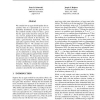Free Online Productivity Tools
i2Speak
i2Symbol
i2OCR
iTex2Img
iWeb2Print
iWeb2Shot
i2Type
iPdf2Split
iPdf2Merge
i2Bopomofo
i2Arabic
i2Style
i2Image
i2PDF
iLatex2Rtf
Sci2ools
118
click to vote
UAI
2008
2008
A Game-Theoretic Analysis of Updating Sets of Probabilities
We consider how an agent should update her uncertainty when it is represented by a set P of probability distributions and the agent observes that a random variable X takes on value x, given that the agent makes decisions using the minimax criterion, perhaps the best-studied and most commonly-used criterion in the literature. We adopt a game-theoretic framework, where the agent plays against a bookie, who chooses some distribution from P. We consider two reasonable games that differ in what the bookie knows when he makes his choice. Anomalies that have been observed before, like time inconsistency, can be understood as arising because different games are being played, against bookies with different information. We characterize the important special cases in which the optimal decision rules according to the minimax criterion amount to either conditioning or simply ignoring the information. Finally, we consider the relationship between conditioning and calibration when uncertainty is des...
Agent Makes Decisions | Artificial Intelligence | Commonly-used Criterion | Minimax Criterion | UAI 2008 |
Related Content
| Added | 30 Oct 2010 |
| Updated | 30 Oct 2010 |
| Type | Conference |
| Year | 2008 |
| Where | UAI |
| Authors | Peter Grünwald, Joseph Y. Halpern |
Comments (0)

